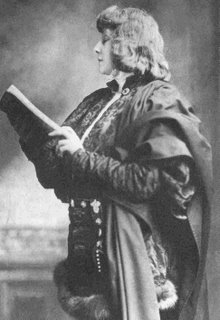 The introduction to my Dover edition of Shakespeare’s Hamlet (written between 1599-1601, when the poet was in his mid thirties) discusses what is thought to have been a prior version of Hamlet, known as the Ur-Hamlet, written some ten years previously. It is widely speculated that this original version was written by Thomas Kyd, who wrote the sensationalist, blockbuster style The Spanish Tragedy.
The introduction to my Dover edition of Shakespeare’s Hamlet (written between 1599-1601, when the poet was in his mid thirties) discusses what is thought to have been a prior version of Hamlet, known as the Ur-Hamlet, written some ten years previously. It is widely speculated that this original version was written by Thomas Kyd, who wrote the sensationalist, blockbuster style The Spanish Tragedy.Anyone who has read Kyd’s The Spanish Tragedy will be immediately tempted to think this is so. The Spanish Tragedy has so many elements that appear in Hamlet and even Othello. Then there is another school of thought that thinks it was Shakespeare himself who wrote the original Ur-Hamlet, when he was in his mid fifties. Literary critic, Harold Bloom, in his Shakespeare, Invention of the Human, speculates on what that original Hamlet would have been like. I guess you could put it this way – Shakespeare’s first Hamlet would have been a mix of Kyd and Marlowe, minus the brilliant, ‘free agent of himself’ Hamlet of the 1601 version.
Poor Harold Bloom. So enamoured of the poet is he that he simply cannot bear to contemplate the possibility that Shakespeare might have pilfered a few ideas from that entertaining hack Thomas Kyd. It’s beyond me why we should really care. Surely great artists all the time are taking ideas from the popular culture as points of departure. Besides, the character of Hamlet, the personality I should rather say, is light years away from anything Kyd could ever hope to produce. Some philosopher, I forget which, said that the wise have more to learn from fools than fools have to learn from the wise. That’s my opinion when it comes to Shakespeare borrowing from Kyd.
Harold Bloom proposes that it was Shakespeare who wrote the original Ur-Hamlet, and that it was Kyd who later pilfered Shakespeare. That’s why The Spanish Tragedy is so redolent with Shakespearean tricks and gimmicks. Hmm. I’m not so sure about this. Doesn’t Heironomo in The Spanish Tragedy say exactly what Iago says at the end of Othello, after having caused so much mischief. ‘From this moment I’ll speak no more.’ Like Iago, he is to be dragged off to be tortured. Othello was written way after The Spanish Tragedy. Plus the fact that Harold Bloom describes Shakespeare’s own Titus Andronicus as a spoof on Kyd and Marlowe. Doesn’t this prove that The Spanish Tragedy, with its crassness, was an original invention, and not a copy from Shakespeare. It doesn’t make sense for Shakespeare to spoof his own ideas so savagely.
Enough of that though. I’ve read Hamlet at least half a dozen times and it forever amazes. Primarily of course there is the personality of Hamlet, the ‘freest agent of himself’, whose astonishing intelligence makes him hover above the action of the play. Then there is the absolute versatility of the text (some 4000 lines long, running to four hours of play time.) The peerless Australian author Christina Stead suggested it was the first novel ever written. I can’t help but agree: it does read like a novel. It seems impossible to think that the great speeches of the play could be absorbed aurally. Obviously they demand being read over and over.
This is in line with Harold Bloom’s other theory, that Shakepeare wrote Hamlet as a personal odyssey, and not necessarily for the stage. This makes complete sense too. It must have been a pet project. There is apparently little proof to support that it was ever acted in its entirety, and that if it was, it would have been only on a handful of occasions.
As Hamlet has come down to us, it is a play that can be read in any number of ways. It can be read for its psychological insights, for its poetry, its philosophy. It can be performed as a play, or its great speeches can be learned by heart. It is simply one of the most inexhaustable pieces of literature in the world.
The primary theme of course is one of action: to be or not to be. Should Hamlet act to avenge his father’s murder? What I love so much about Hamlet is how too much thinking and little action is seen to be an absolute sickness. Healthy people act but do not think. Unhealthy people think, but do not act. The young upstart Fortinbras ends triumphantly in the play, whereas deep-thinker Hamlet drags down all around him in death.
Indeed, there is so much disease in this play. When Hamlet’s mother, Queen Gertrude, cries that Hamlet has broken her heart in two, Hamlet responds, ‘Throw away the worser part of it’ – one assumes, the more diseased half.
Hamlet throws up all the questions we ask ourselves when we are in our more desperately contemplative moods, and gives no easy, or even complete, answers. Hamlet’s disease it too much thinking. No wonder it’s commonly thought that the best consolation for grief is work.
Last words to Harold Bloom. Discussing Hamlet he says:
‘Desire and destiny are contraries, and all thought thus must undo itself.’
No, last words to me. One wonders, is there any point then in thinking, reading and writing? Hamlet seems a border line case on this issue. When asked what he is reading he sighs, ‘words, words, words’.
(PS: Picture above is actress Sarah Bernhardt as Hamlet.)
No comments:
Post a Comment